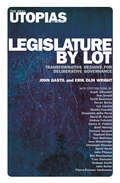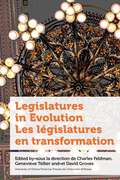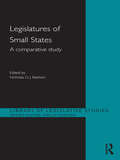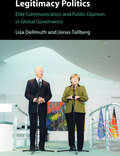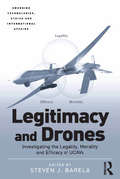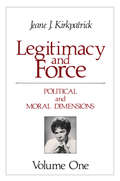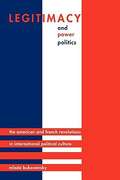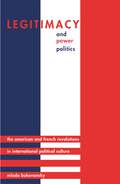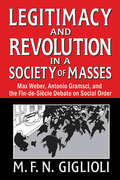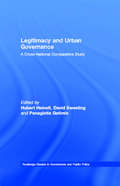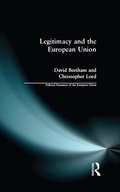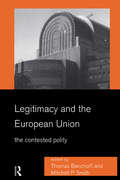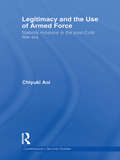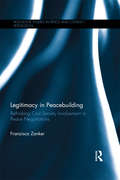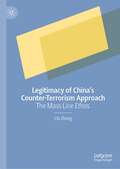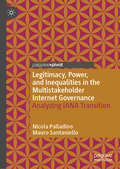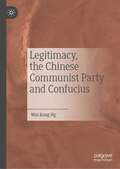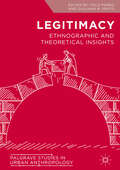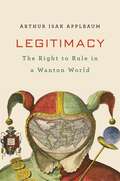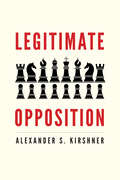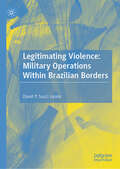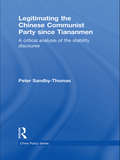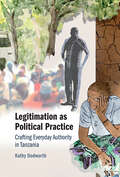- Table View
- List View
Legislators, Leaders, and Lawmaking: The U. S. House of Representatives in the Postreform Era
by Barbara SinclairRecently plagued by gridlock, huge deficits, and deep policy differences between the president and congressional majorities, Congress has often been the target of relentless and bitter criticism. In this context, Sinclair asks, how has the House not only performed its legislative functions but also managed to enhance its role in the American political system? In Legislators, Leaders, and Lawmakers, Sinclair traces the emergence of a House majority party leadership that is highly active and deeply involved in multiple aspects of the legislative process, and yet one that leads by means of a participatory and inclusive style.
Legislature by Lot: Transformative Designs for Deliberative Governance
by Erik Olin Wright John GastilDemocracy means rule by the people, but in practice even the most robust democracies delegate most rule making to a political classThe gap between the public and its representatives might seem unbridgeable in the modern world, but Legislature by Lot examines an inspiring solution: a legislature chosen through “sortition”—the random selection of lay citizens. It’s a concept that has come to the attention of democratic reformers across the globe. Proposals for such bodies are being debated in Australia, Belgium, Iceland, the United Kingdom, and many other countries. Sortition promises to reduce corruption and create a truly representative legislature in one fell swoop.In Legislature by Lot, John Gastil and Erik Olin Wright make the case for pairing a sortition body with an elected chamber within a bicameral legislature. Gastil is a leading deliberative democracy scholar, and Wright a distinguished sociologist and editor of the Real Utopias series, of which this is a part. In this volume, they bring together critics and advocates of sortition who have studied ancient Athens, deliberative polling, political theory, social movements, and civic innovation. Without obscuring its limitations, the contributors offer a wide variety of ideas for how to implement sortition and examine its potential for reshaping modern politics.Legislature by Lot includes sixteen essays that respond to Gastil and Wright’s detailed proposal. Essays comparing sortition to contemporary reforms see it as a dramatic extension of deliberative “minipublics,” which gather random samples of citizens to weigh public policy dilemmas without being empowered to enact legislation. Another set of essays explores the democratic principles underlying sortition and elections and considers, for example, how a sortition body holds itself accountable to a public that did not elect it. The third set of essays considers alternative paths to democratic reform, which limit the powers of a sortition chamber or more quickly establish a pure sortition body.With contributions by Arash Abizadeh, Tom Arnold, Terrill Bouricius, Deven Burks, Lyn Carson, Dimitri Courant, Donatella della Porta, David M. Farrell, Andrea Felicetti, James S. Fishkin, Brett Hennig, Vincent Jacquet, Raphaël Kies, Tom Malleson, Jane Mansbridge, Christoph Niessen, David Owen, John Pitseys, Min Reuchamps, Yves Sintomer, Graham Smith, Jane Suiter, and Pierre-Étienne Vandamme.
Legislatures in Evolution / Les législatures en transformation
by Charles Feldman, Geneviève Tellier & David GrovesLegislatures in Evolution presents a series of essays on evolution and change in the legislative context. They cover a wide range of topics, including both proposed and implemented reforms. The contributions included here discuss parliamentarians’ attitude toward party discipline; the specific challenges associated with implementing sexual harassment policies within legislatures; the consequences of the Supreme Court’s ruling in Mikisew Cree First Nation v. Canada on the government’s duty to consult Indigenous Peoples when drafting legislation; parliamentarians’ engagement in budgetary control issues; the reform of the rules governing prayers in the Legislature of British Columbia; and time management reforms in the Legislative Assembly of Yukon. Charles Feldman, Geneviève Tellier, David Groves, and their contributors bring together both practical and academic experience and perspectives. They conclude with an analysis of parliamentary reforms, paying particular attention to the impact of the COVID-19 pandemic on the functioning of legislatures.
Legislatures of Small States: A Comparative Study (Library of Legislative Studies)
by Nicholas D. J. BaldwinThis book provides a comparative study of the legislatures of small nations, states and territories, to explore the extent to which size is a factor in how they function and fulfil the roles and responsibility of a legislature. Though the physical nature and environment of states is a neglected subject in political science research, this book examines the impact of small state size on the structure and functions of legislatures and contributes to a better understanding of the interplay of physical and social factors. Focussing on legislatures in democratic nations or in territories that are parts of democratic units, the book features case studies on Malta, Bermuda, Jersey, Guernsey, Gibraltar, Hong Kong, Lesotho, Liechtenstein, the Isle of Man, Commonwealth Caribbean, Nunavut (Canada), Pacific islands, Swaziland, and Scotland. Contributors employ an interdisciplinary approach to examine both the outcomes and causes of different political mechanisms, and bring to the surface underlying correlation between small states through their analysis. Legislatures of Small States will be of interest to students and scholars of international politics, comparative politics and legislative studies.
Legitimacy Politics: Elite Communication and Public Opinion in Global Governance
by Jonas Tallberg Lisa DellmuthOnce staunch advocates of international cooperation, political elites are increasingly divided over the merits of global governance. Populist leaders attack international organizations for undermining national democracy, while mainstream politicians defend their importance for solving transboundary problems. Bridging international relations, comparative politics, and cognitive psychology, Lisa Dellmuth and Jonas Tallberg explore whether, when, and why elite communication shapes the popular legitimacy of international organizations. Based on novel theory, experimental methods, and comparative evidence, they show that elites are influential in shaping how citizens perceive global governance and explain why some elites and messages are more effective than others. The book offers fresh insights into major issues of our day, such as the rise of populism, the power of communication, the backlash against global governance, and the relationship between citizens and elites. It will be of interest to scholars and students of international organisations, and experimental and survey research methods.
Legitimacy and Drones: Investigating the Legality, Morality and Efficacy of UCAVs (Emerging Technologies, Ethics and International Affairs)
by Steven J. BarelaUnmanned combat air vehicles, or in common parlance 'drones', have become a prominent instrument in US efforts to counter an objective (and subjective) cross-border terrorist threat with lethal force. As a result, critical questions abound on the legitimacy of their use. In a series of multidisciplinary essays by scholars with an extensive knowledge of international norms, this book explores the question of legitimacy through the conceptual lenses of legality, morality and efficacy, it then closes with the consideration of a policy proposal aimed at incorporating all three indispensable elements. The importance of this inquiry cannot be overstated. Non-state actors fully understand that attacking the much more powerful state requires moving the conflict away from the traditional battlefield where they are at an enormous disadvantage. Those engaging in terrorism seek to goad the ruling government into an overreaction, or abuse of power, to trigger a destabilization via an erosion of its legitimacy. Thus defending the target of legitimacy”in this case, insuring the use of deadly force is constrained by valid limiting principles”represents an essential strategic interest. This book seeks to come to grips with the new reality of drone warfare by exploring if it can be used to preserve, rather than eat away at, legitimacy. After an extensive analysis of the three key parameters in twelve chapters, the practical proposition of establishing a 'Drone Court' is put forward and examined as a way of pursuing the goal of integrating these essential components to defend the citizenry and the legitimacy of the government at the same time.
Legitimacy and Force: Volume 1: Political and Moral Dimensions
by Jeane J. KirkpatrickLegitimacy and Force, Volumes One and Two are the state papers of Jeane J. Kirkpatrick as the United States Permanent Representative to the United Nations. The volumes feature all of the ambassador's UN and congressional testimonies, addresses, speeches and statements and a broad selection of speeches on international affairs and human rights. Together they present a lucid and comprehensive account of the position of one of America's most controversial UN representatives.Volume One is oriented around themes of democratic societies and undemocratic systems, human rights and political obligations. Kirkpatrick examines the nature and legitimacy of democracy and the illegitimate nature of undemocratic nations. She also offers poignant commentary on the presidential election of 1980 and what the "Reagan phenomenon" has meant to the United States and the West.Volume Two offers Kirkpatrick's formal remarks on nations and nation-building. She focuses on Grenada, Poland, Afghanistan, Nicaragua, and the Soviet Union. She provides a particularly trenchant analysis of Israel: the Camp David accords, the assault on Israel inside the United Nations, and on the Middle East in general. Essential reading for everyone interested in the policymaking arena, these volumes exemplify Kirkpatrick's articulate conceptual underpinning of present-day American foreign policy.These volumes, far from the usual government position papers, range widely and personally over the major international issues of our times. They are amplified in essays and articles written by Dr. Kirkpatrick for special occasions not related to specific UN work. In addition, the volumes contain crucial papers that were written after her resignation from the UN ambassadorship-and hence reflect Kirkpatrick's current interests and persuasions.
Legitimacy and Power Politics: The American and French Revolutions in International Political Culture
by Mlada BukovanskyThis book examines the causes and consequences of a major transformation in both domestic and international politics: the shift from dynastically legitimated monarchical sovereignty to popularly legitimated national sovereignty. It analyzes the impact of Enlightenment discourse on politics in eighteenth-century Europe and the United States, showing how that discourse facilitated new authority struggles in Old Regime Europe, shaped the American and French Revolutions, and influenced the relationships between the revolutionary regimes and the international system. The interaction between traditional and democratic ideas of legitimacy transformed the international system by the early nineteenth century, when people began to take for granted the desirability of equality, individual rights, and restraint of power. Using an interpretive, historically sensitive approach to international relations, the author considers the complex interplay between elite discourses about political legitimacy and strategic power struggles within and among states. She shows how culture, power, and interests interacted to produce a crucial yet poorly understood case of international change. The book not only shows the limits of liberal and realist theories of international relations, but also demonstrates how aspects of these theories can be integrated with insights derived from a constructivist perspective that takes culture and legitimacy seriously. The author finds that cultural contests over the terms of political legitimacy constitute one of the central mechanisms by which the character of sovereignty is transformed in the international system--a conclusion as true today as it was in the eighteenth century.
Legitimacy and Power Politics: The American and French Revolutions in International Political Culture (Princeton Studies in International History and Politics #120)
by Mlada BukovanskyThis book examines the causes and consequences of a major transformation in both domestic and international politics: the shift from dynastically legitimated monarchical sovereignty to popularly legitimated national sovereignty. It analyzes the impact of Enlightenment discourse on politics in eighteenth-century Europe and the United States, showing how that discourse facilitated new authority struggles in Old Regime Europe, shaped the American and French Revolutions, and influenced the relationships between the revolutionary regimes and the international system. The interaction between traditional and democratic ideas of legitimacy transformed the international system by the early nineteenth century, when people began to take for granted the desirability of equality, individual rights, and restraint of power. Using an interpretive, historically sensitive approach to international relations, the author considers the complex interplay between elite discourses about political legitimacy and strategic power struggles within and among states. She shows how culture, power, and interests interacted to produce a crucial yet poorly understood case of international change. The book not only shows the limits of liberal and realist theories of international relations, but also demonstrates how aspects of these theories can be integrated with insights derived from a constructivist perspective that takes culture and legitimacy seriously. The author finds that cultural contests over the terms of political legitimacy constitute one of the central mechanisms by which the character of sovereignty is transformed in the international system--a conclusion as true today as it was in the eighteenth century.
Legitimacy and Revolution in a Society of Masses: Max Weber, Antonio Gramsci, and the Fin-de-Sicle Debate on Social Order
by M. F. N. GiglioliQuestions surrounding the concept of legitimacy—the force that keeps a polity together, and whose absence causes it to shatter—are possibly the most important concern of a study of politics. M. F. N. Giglioli examines the shift to a distinctly modern understanding of the concept in Continental Europe, following the crisis of liberal rationalism in the late nineteenth century, and the search for new ways of envisaging the determinants of collective action into the twentieth century.The author examines certain aspects of the intellectual and political background of early twentieth-century theories of legitimacy elaborated by Max Weber and Antonio Gramsci. These theories are interpreted as the outcome of a contested process of redefinition of the concept, itself prompted by the social and political circumstances of the late nineteenth century, such as economic modernization and the attempt to incorporate the working class into the political system.This is the first book in a generation to offer a general reassessment of issues of legitimacy in political thought at the turn of the twentieth century. It examines the development of the concept in France, Italy, and Germany during the half-century or so following the Paris Commune. It discusses six key critics of classical Victorian liberalism on the revolutionary Left and the conservative Right. The political position and biography of each is a central focus of the study, as the culture of the age was decisively shaped by reflection on the social role of intellectuals.
Legitimacy and Urban Governance: A Cross-National Comparative Study (Routledge Studies in Governance and Public Policy #Vol. 9)
by Hubert Heinelt Panagiotis Getimis David SweetingA fresh examination of the relationship between two key issues in the on-going debate on urban governance - leadership and community involvement. It explores the nature of the interaction between community involvement and political leadership in modern local governance by drawing on empirical data gathered from case-studies concerning cities in England, Germany, Greece, Italy, the Netherlands, New Zealand, Norway, Poland, and Sweden. It presents both a country specific and cross-cutting analysis of the contributions that communities and leaders can make to more effective local governance. These country specific chapters are complemented by thematic, comparative chapters addressing alternative forms of community involvement, types and styles of leadership, multi-level governance, institutional restrictions and opportunities for leadership and involvement, institutional conditions underpinning leadership and involvement, and political culture in cities. This up-to-date survey of trends and developments in local governance moves the debate forward by analysing modern governance with reference to theories related to institutional theory, legitimation, and the way urban leadership and community involvement compliment one another. This book will be of great interest to students and scholars of politics and urban governance, and to all those concerned with questions of local governance and democracy.
Legitimacy and the European Union (Political Dynamics of the European Union)
by David Beetham Christopher LordMost of the contemporary debates about the European Union - about its role, its institutional arrangements, its development dynamic, its expansion and possible futures - revolve around the issue of political legitimacy. Legitimacy and the European Union addresses the fundamental issues at the heart of the debates on Europe and examines such key questions as:- -What is the scope of the EU's authority -Is there a legitimacy deficit? If so, how much does it matter -Does political legitimacy only reside in the nation state? Using a multi-dimensional conception of political legitimacy, the text analyses the character and problems of the European Union's authority in respect of democracy, political identity and governmental performance. Its distinctive claim is that political legitimacy can now only be understood as a process of interaction between the state and EU levels, and that this interaction impacts differentially on different member states.
Legitimacy and the European Union: The Contested Polity
by Thomas Banchoff Mitchell P. SmithSince the Maastricht ratification debate of the early 1990s, the legitimacy of the European Union has become a subject of controversy. With unprecedented force, Europeans have begun to question the need for deeper integration. Some fear threats to established national identities, while others perceive the emergence of a distant but powerful Brussels, beyond the reach of democratic control. Legitimacy and the European Union breaks with established approaches to the problem of the legitimacy of the European Union by focusing on the recent trend towards reconceptualization of the EU not as a superstate or an organization of states, but as a multi-level, contested polity without precedent. The book examines the implications of this reconceptualization for the problem of legitimacy. Individual chapters focus on policy areas, institutions and identity politics. Taken together, they reach two main conclusions. While Europeans do not strongly identify with the EU, they increasingly recognize it as a framework for politics alongside existing national and subnational structures. And while the EU lacks central democratic institutions, the integration process has spawned significant informal and pluralist forms of representation. Rethinking recognition and representation ouside the context of the nation state points to important, if little understood, actual and potential sources of EU legitimacy.
Legitimacy and the Use of Armed Force: Stability Missions in the Post-Cold War Era (Contemporary Security Studies)
by Chiyuki AoiThis book examines the concept of legitimacy as it may be used to explain the success, or failure, of key stability operations since the end of the Cold War. In the success of stability operations, legitimacy is key. In order to achieve success, the intervening force must create a sense of legitimacy of the mission among the various constituencies concerned with and involved in the venture. These parties include the people of the host nation, the host government (whose relations with the local people must be legitimate), political elites and the general public worldwide—including the intervening parties’ own domestic constituencies, who will sustain (or not sustain) the intervention by offering (or withdrawing) support. This book seeks to bring into close scrutiny the legitimacy of stability interventions in the post-Cold War era, by proposing a concept that captures both the multi-faceted nature of legitimacy and the process of legitimation that takes place in each case. Case studies on Liberia, Bosnia, Somalia, Rwanda, Afghanistan and Iraq explain how legitimacy related to the outcome of these operations. This book will be of much interest to students of stability operations, counterinsurgency, peace operations, humanitarian intervention, and IR/security studies in general.
Legitimacy in Peacebuilding: Rethinking Civil Society Involvement in Peace Negotiations (Routledge Studies in Peace and Conflict Resolution)
by Franzisca ZankerThe book offers a critical analysis of legitimacy in peacebuilding, with a focus on peace negotiations and civil society participation in particular. The aim of this book is to unpack the meaning of legitimacy for the population in peacebuilding processes and the relationship this has with civil society involvement. There is a growing consensus for addressing local concerns in peacebuilding, with the aim of ensuring local ownership. Moreover, scholars have noted a relationship between civil society inclusion in peace negotiations and legitimacy. Yet, the very idea of legitimacy remains a black box. Using data from original empirical fieldwork – including over 100 semi-structured interviews and 12 focus group discussions – the book focuses on two case studies of negotiations that, respectively, ended a long civil war in Liberia in 2003 and ended the post-election violence in Kenya in 2008. It argues that civil society involvement is conceptually insufficient to show a multidimensional understanding of legitimacy. Instead, the book shows a complex picture of legitimate peace negotiations, based on outcome and participation-based characteristics with the involvement of both ‘guarantors’ of legitimacy and a more general civic agency which includes the general population. Through forms of participative communication, the passive audience become active stakeholders in the construction of legitimacy. This has repercussions for how we think about civil society and peacebuilding more generally. This book will be of much interest to students of peacebuilding, conflict resolution, security studies and IR in general.
Legitimacy of China’s Counter-Terrorism Approach: The Mass Line Ethos
by Chi ZhangThis book examines how the Chinese Communist Party (CCP) has sought to legitimise its counter-terrorism strategy in the eyes of its domestic and international audiences. An important element of CCP policy in Xinjiang has been the deployment of ordinary Chinese citizens, or the 'mass line,’ to create new realities on the ground. This book explores how the history of ideological struggle in the PRC has taken on new characteristics, as well as offering insight into how the CCP has maintained legitimacy in the eyes of its population, even as it pursues policies which are internationally controversial, shedding light on the past and future of the behaviour of the Chinese state, a subject of interest to China scholars, scholars of the Belt and Road, and counter-terrorism experts.
Legitimacy, Peace Operations and Global-Regional Security: The African Union-United Nations Partnership in Darfur (Security and Governance)
by Linnea GelotAt the turn of the century the regional-global security partnership became a key element of peace and security policy-making. This book investigates the impact of the joint effort made by the African Union (AU) and the United Nations (UN) to keep the peace and protect civilians in Darfur. This book focuses on the collaboration that takes place in the field of conflict management between the global centre and the African regional level. It moves beyond the dominant framework on regional-global security partnerships, which mainly considers one-sided legal and political factors. Instead, new perspectives on the relationships are presented through the lens of international legitimacy. The book argues that the AU and the UN Security Council fight for legitimacy to ensure their positions of authority and to improve the chances of success of their activities. It demonstrates in regard to the case of Darfur why and how legitimacy matters for states, international organisations, and also for global actors and local populations. Legitimacy, Peace Operations and Global-Regional Security will be of interest to students and scholars of International Relations, African Security and Global Governance.
Legitimacy, Power, and Inequalities in the Multistakeholder Internet Governance: Analyzing IANA Transition (Information Technology and Global Governance)
by Nicola Palladino Mauro SantanielloThis book aims to develop a critical understanding of multistakeholder governance in Internet Governance through an in-depth analysis of the Internet Assigned Numbers Authority (IANA) transition, the process through which the U.S. Government transferred its traditional oversight role over the Domain Name System to the global Internet community. In the last few decades, multistakeholderism has become the dominant discourse in the Internet Governance field, mainly because of its promise to provide democratic legitimacy for transnational policymaking, although empirical research has highlighted disappointing performances of multistakeholder arrangements. This book contributes to the debate on multistakeholder governance by analyzing the IANA Transition process's normative legitimacy, broken down in the dimensions of input legitimacy (inclusiveness, balanced representation, and representativeness), throughput legitimacy (procedural and discursive quality), and output legitimacy (outcome and institutional effectiveness). Findings warn about the risk that multistakeholderism could result in a misleading rhetoric legitimizing existing power asymmetries.
Legitimacy, the Chinese Communist Party and Confucius
by Wai Kong NgThis book explores the use of Confucianism by the Chinese Communist Party in its assertion of political legitimacy. Confucian thought offers an enduring framework for political legitimacy in East Asian societies, including China. All states strive to acquire legitimacy, and despite once denouncing Confucianism as the remnants of feudal poison, the Party is turning towards Confucianism as part of its legitimation efforts. This suggests that the Party is suffering from an ideological void in terms of legitimacy and legitimation due to the diminishing relevance of Marxism in Chinese societal practices. The book will devise a non-liberal legitimacy framework, drawing on the ideas of Habermas and Bernard Williams, to examine the legitimacy of the Party, and use an analysis of the elite discourse to determine the nature of the Confucian turn, in a sharp polemic that will interest scholars of Chinese politics, of the role of traditional beliefs in Asian modernity, and in China's future.
Legitimacy: Ethnographic and Theoretical Insights (Palgrave Studies in Urban Anthropology #Vol. 12)
by Italo Pardo Giuliana B. PratoGlobal in scope, this original and thought-provoking collection applies new theory on legitimacy and legitimation to urban life. An informed reflection on this comparatively new topic in anthropology in relation to morality, action, law, politics and governance is both timely and innovative, especially as worldwide discontent among ordinary people grows. The ethnographically-based analyses offered here range from banking to neighbourhoods, from poverty to political action at the grassroots. They recognize the growing gap between the rulers and the ruled with particular attention to the morality of what is right as opposed to what is legal. This book is a unique contribution to social theory, fostering discussion across the many boundaries of anthropological and sociological studies.
Legitimacy: The Right to Govern in a Wanton World
by Arthur Isak ApplbaumWhat makes a government legitimate? Arthur Isak Applbaum rigorously argues that the greatest threat to democracies today is not loss of basic rights or despotism. It is the tyranny of unreason: domination of citizens by incoherent, inconstant, incontinent rulers. A government that cannot govern itself cannot legitimately govern others.
Legitimate Opposition
by Alexander S. KirshnerThe first theory of legitimate opposition in fifty years In political systems defined by legitimate opposition, those who hold power allow their rivals to peacefully challenge and displace them, and those who have lost power do not seek to sabotage the winners. Legitimate opposition came under assault at the American capitol on January 6, 2021, and is menaced by populists and autocrats across the globe. Alexander Kirshner provides the first sustained theory of legitimate opposition since the Cold War. On the orthodox view, democracy is lost when legitimate opposition is subverted. But efforts to reconcile opposition with democracy fail to identify the value of the frequently imperfect, unfair and inegalitarian real-world practice. Marshaling a revisionist reconstruction of opposition&’s history, Kirshner&’s book provides a new account of opposition&’s value fit for the twenty-first century and shows why, given the difficult conditions of political life, legitimate opposition is an achievement worth defending.
Legitimating Violence: Military Operations Within Brazilian Borders
by David P. Succi JuniorThe book challenges the main theoretical assumption on the military-police distinction, grounding works on contemporary military missions and security policies, and provides tools to overcome the analytical hindrances posed by the traditional framework. It is argued that the question to be asked to understand the deployment of the armed forces within national borders refers less to the identification of an essential police and military activity and more to how the process of proposing and accepting the use of force takes place. That is, how a particular use of the state&’s instruments of lethality is legitimized. Legitimation is conceptualized as a communicative process in which a set of actors, through discursive practices, mobilize and articulate ideational resources within a particular social arrangement, reinterpreting and articulating them to make sense of a particular situation and justify a course of action, producing an apparent consensus. The book presents an analytical framework to address processes of violence legitimation, designed to provide a tridimensional view of the interplay between actors, ideas, and social arrangement, dissecting how the line of the acceptable use of force is shaped and stabilized. It is applied to Brazil, specifically, to three major military domestic operations – Operation Rio (1994-1995), Operation Arcanjo (2010-2012), and Operation Rio de Janeiro (2017-2018). Brazil has a history of internal military deployment, and the selected operations are relevant in terms of troops&’ number, duration, and publicity. The book proceeds through the analysis of parliamentary sessions, media coverage, and public discourses uttered by presidents, ministers, and military leaders. It is of interest to different readerships, contributing to the debate on legitimacy and IR, critical approaches to International Security, Military Studies, and Civil-Military Relations. It also provides an empirical contribution to scholars focused on Brazil, Latin America, and armed forces in the Global South. Finally, the research underpinning the book won the prize of best 2023 PhD dissertation in Political Science and International Relations in Brazil, granted by the Brazilian Ministry of Education.
Legitimating the Chinese Communist Party Since Tiananmen: A Critical Analysis of the Stability Discourse (China Policy Series)
by Peter Sandby-ThomasThe dominant view concerning the rule of the Chinese Communist Party (CCP) is that it is simply a matter of time before it comes to an end. This view has been dominant since the pro-democracy protests in 1989 and has only been strengthened by the increasing number of protests in recent years. However, the Chinese Communist Party has continued to remain in power throughout this period and its rule appears to be secure in the short-to medium-term. As the twentieth anniversary of the military suppression of the pro-democracy demonstrations approaches, this book explains how the Chinese Communist Party has maintained its authority since 1989. It provides a detailed analysis of the Party’s discourse emphasising stability in the post-Tiananmen period, analysing the government’s propaganda in order to show how this discourse has been used by the Party to legitimate its authority. The interdisciplinary nature of this book makes it relevant to a number of different academic disciplines including Asian studies, China studies, international relations, politics and sociology.
Legitimation as Political Practice: Crafting Everyday Authority in Tanzania
by Kathy DodworthLegitimacy has long been perceived through a Westernized lens as a fixed, binary state. In this book, Kathy Dodworth offers an exploration of everyday legitimation practices in coastal Tanzania, which challenges this understanding within postcolonial contexts. She reveals how non-government organizations craft their authority to act, working with, against and through the state, and what these practices tell us about contemporary legitimation. Synthesizing detailed, ethnographic fieldwork with theoretical innovations from across the social sciences, legitimacy is reworked not as a fixed state, but as a collection of constantly renegotiated practices. Critically adopting insights from political theory, sociology and anthropology, this book develops a detailed picture of contemporary governance in Tanzania and beyond in the wake of waning Western dominance.

